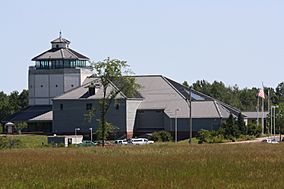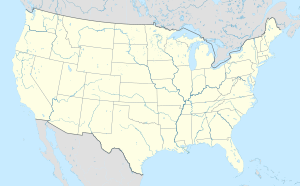Whittlesey Creek National Wildlife Refuge facts for kids
Quick facts for kids Whittlesey Creek National Wildlife Refuge |
|
|---|---|
|
IUCN Category IV (Habitat/Species Management Area)
|
|

|
|
| Location | Barksdale, Bayfield County, Wisconsin, United States |
| Nearest city | Ashland, Wisconsin |
| Area | 329 acres (1.33 km2) |
| Established | 1999 |
| Governing body | U.S. Fish and Wildlife Service |
| Website | Whittlesey Creek National Wildlife Refuge |
The Whittlesey Creek National Wildlife Refuge is a special natural area. It is located near Ashland, Wisconsin, right by Lake Superior. This refuge is part of a big area of wetlands. These wetlands are very important for animals and plants living along the south shore of Lake Superior.
Contents
About Whittlesey Creek Refuge
This wildlife refuge was created in 1999. It is still growing today! The main goal of the refuge is to protect and improve coastal wetlands. It also helps spring-fed streams. These streams are important for many types of wildlife.
Why the Refuge Was Created
The refuge works to protect, restore, and manage these important natural places. It helps the homes of many animals and plants. The plan is to protect a large area of coastal wetlands. This includes land in the Whittlesey Creek watershed. Some land is bought by the refuge. Other land is protected through special agreements called conservation easements. These agreements help keep the land natural. As of 2010, about 329 acres (1.33 km²) of land were protected.
Helping Fish and Birds
One big goal of the refuge is to help a special fish. This fish is called the coaster brook trout. It is a type of trout that lives in Lake Superior. These fish are potamodromous. This means they move between lakes and rivers to lay their eggs. The refuge helps restore the streams and wetlands where these fish live. This also helps many other kinds of fish. Plus, it provides a safe place for birds that travel long distances.
Visiting the Refuge
The Whittlesey Creek National Wildlife Refuge is located right next to the Northern Great Lakes Visitor Center. This center is a great place to learn about the refuge. It is run by several groups, including the U.S. Fish and Wildlife Service and the U.S. Forest Service. The Visitor Center is the main office for the refuge. It is also a place where you can get information.
 | Toni Morrison |
 | Barack Obama |
 | Martin Luther King Jr. |
 | Ralph Bunche |


